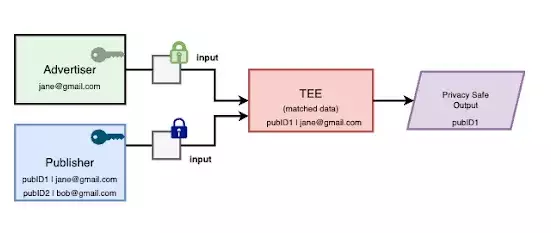As the conversation around consumer privacy intensifies, platforms like Google are challenged to innovate within the digital advertising space without compromising users’ personal information. The emergence of “confidential matching” represents a significant attempt by Google to strike a balance between optimal ad targeting and privacy principles. This novel approach aims to marry the insights generated by Google with a business’s first-party data while keeping the latter secure and private.
Confidential matching operates on the premise of using Trusted Execution Environments (TEEs) to enhance privacy safeguards around data processing. Unlike traditional models where personal data risk exposure is higher, TEEs allow data to be combined in a manner that remains encrypted throughout the process. This innovative method ensures that no identifiable information leaks during the ad-targeting phase. As highlighted by Google, the TEE’s design is such that even administrators cannot access or manipulate its contents directly, effectively shielding it from both external and internal breaches. This level of security could mark a paradigm shift in how companies address their data-sharing reservations.
Despite its intentions, Google has faced significant hurdles in implementing privacy-centered initiatives. Initially, the tech giant planned to phase out cookie tracking on its Chrome browser by 2022, only to postpone this effort multiple times due to pushback from various industry stakeholders and regulatory bodies. This ongoing struggle marks a common theme in the tech landscape, where promising strategies often undermine existing processes before becoming broadly accepted. Google’s eventual decision to abandon its earlier cookie phase-out plan in favor of more refined options underscores the difficulties of navigating compliance and consumer expectations.
With confidential matching now serving as the default for connecting data through Customer Match, businesses stand to gain a competitive edge without sacrificing privacy. This approach not only allows advertisers to leverage enhanced targeting capabilities but also gives them control over their data encryption. For organizations with stringent data privacy policies, the opportunity to encrypt their data before it leaves their servers adds an extra layer of reassurance. Such steps towards improved data security can foster greater client trust and enhance brand loyalty.
With Google’s confidential matching initiative, the digital advertising landscape could be on the brink of a transformation that resonates beyond mere technological advances. The ability to engage with audiences effectively, while also respecting their privacy, presents a dual advantage in an increasingly cautious environment. Although the complexities of these technological processes may be daunting for many marketers, the potential outcomes offer a glimmer of hope. As the industry grapples with privacy issues, Google’s efforts may herald a new chapter, paving the way for ethical and effective advertising strategies. The future will likely see continued refinement of these tools as Google adapts to the demands of a data-conscious marketplace, encouraging other platforms to follow suit.


Leave a Reply